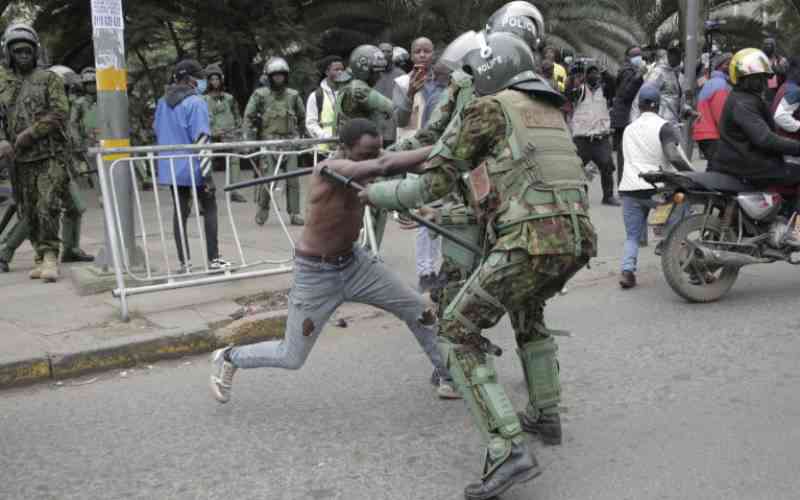Poland temporarily suspends right to asylum - DW - 02/28/2025
Poland's Prime Minister Donald Tusk considers his country to be under threat. The source of this threat is not just Russia's war in neighboring Ukraine, but also migration to Poland from neighboring Belarus that is being orchestrated by that country and Russia.
"We are dealing with a new form of migration where authoritarian regimes are organizing human smuggling on a large scale," Tusk said in Brussels last October.
Heads of governments from across the EU spoke at the time of a "weaponization of migrants" by Russian President Vladimir Putin and Belarusian dictator Alexander Lukashenko.
The situation began in 2021, when the number of attempted border crossings along the 418-kilometer (260-mile) Polish-Belarusian border suddenly rocketed.
People from the Middle East, Asia and Africa came to Belarus on tourist visas and were brought straight to the Polish border, in many cases by Belarusian soldiers.
Although Warsaw has since reinforced the border with barbed-wire fences, many migrants still attempt to use this route to enter the EU.

The award-winning Polish director Agnieszka Holland described the appalling conditions on Poland's "green border" in her 2023 film of the same name.
Poland's border guards have been accused of turning away people without allowing them to apply for international protection. Polish courts have repeatedly confirmed and condemned illegal pushbacks at the border.
Donald Tusk now wants to address the matter by amending Polish asylum law to allow the temporary suspension of the right to claim asylum.
On February 21, 386 lawmakers in the 460-seat Sejm, the lower house of the Polish parliament, approved a bill that would amend the country's asylum law in this way.
If signed into law, the amendment would permit the suspension of the right to apply for international protection "if instrumentalization of migration is taking place" and if these actions constitute "a serious and real threat to the security of the state or society."
The new rule would not apply to minors, pregnant women, elderly or sick people or people who are persecuted in the neighboring country — in other words in Belarus. This persecution would, however, have to be proven first. The bill would allow the government to decree the suspension of asylum rights for up to 60 days. An extension would have to be approved by parliament.
While some legal experts and left-wing lawmakers spoke of a violation of human rights, Deputy Interior Minister Maciej Duszczyk told the relevant parliamentary committee, "We are only talking about suspending the rights of migrants. There is a grading of civil rights, of human rights. There is a state whose citizens have priority."

Duszczyk went on to say that he didn't believe "that a border guard who sees a mother with a child would refuse them entry to Poland. Such situations could simply not happen."
The Association for Legal Intervention responded to the deputy minister's remarks with a strongly worded statement on Facebook: "Mr. Maciej Duszczyk seems to have a remarkably limited imagination and would not seem to read the newspapers either, because the border crossing Brest-Terespol [on the Belarusian border] has been notorious for just such situations as these for quite some time now — not to mention what is happening in the forests on the borders."
The association went on to say that the situation at the border "does not justify such radical steps and violations of fundamental human rights" in view of the relatively small number of 2,700 applications for international protection received by the border guards in the northeastern region of Podlaskie last year.
For Urszula Wolfram, head of the Podlaskie Volunteer Humanitarian Emergency Service (POPH), the new rule is nothing more than "a legalization of the current pushback practice" of the Polish authorities.
"How is that supposed to work?" she asked, speaking to DW in Warsaw. "Are the border guards supposed to just look people in the eye and then decide for themselves whether the people have a claim to international protection?"

Wolfram points out that it is not up to border guards to decide who has a right to international protection: "In Poland, that's the job of the Immigration Office."
Lawyer Hanna Machinska of the Helsinki Foundation for Human Rights and Poland's former deputy commissioner for human rights speaks of a "drastic violation of international law."
"The law breaches the European Convention on Human Rights. So, if it comes to a case before the European Court of Human Rights, Poland will lose that case," she said.
Machinska added that it was also a breach of the Polish Constitution, which guarantees the right to asylum.
She considers the move purely political and says that with this anti-migration law, Tusk is trying to appeal to voters on the right. "But you cannot act against the opposition by breaking international law," said Machinska.
Poland will elect a new president in May. Whether the new anti-migration law will help Rafal Trzaskowski, the candidate backed by Donald Tusk's Civic Platform (PO), get more votes is impossible to say.
What is certain is that the pro-European mayor of Warsaw has adopted new rhetoric in his election campaign.

"No one in Europe should think that they will force us to do anything," he said in an interview with the website interia.pl. He was referring to the EU Pact on Migration and Asylum, which is due to come into force in 2026. Poland voted against the pact, arguing that its planned distribution of migrants within the EU was unacceptable.
Karol Nawrocki, the presidential candidate supported by the national-conservative Law and Justice (PiS) party, has voiced his agreement with this position and attacked Germany.
"I do not agree with what is happening with migration policy in the European Union," he said at an election rally. "As [future] president of Poland, I do not intend to tolerate the fact that our western neighbors, the Germans, regulate their problems, their mistakes regarding migration policy, risking the safety of our women and children in the process."
With statements such as these, both politicians are hitting a nerve in Polish society. According to a poll conducted by broadcaster RMF24, 75% of respondents feel that Poland should not take in more migrants, 20% say it should, 5% are undecided.
The bill is now before the Senate, the upper house of the Polish parliament, where it is likely to be passed. If it does, the signature of conservative President Andrzej Duda can be considered a formality.
The new law could, therefore, be in force by the time migrant numbers start to rise again in the spring.
This article was originally published in German.











